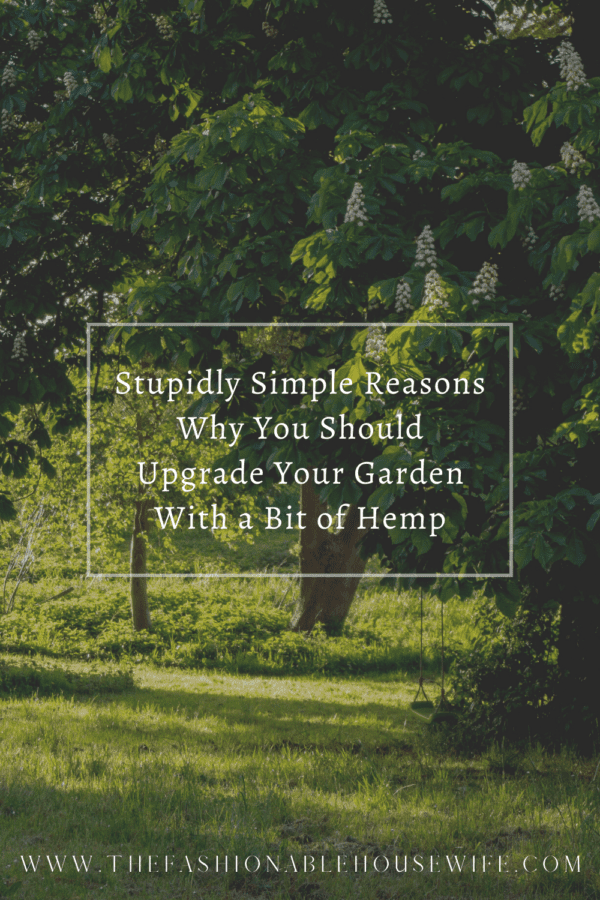
When designing a garden, there is a lot of time and effort put into which plants to include. But, apart from the general look of the plant, each has its benefits. From supporting local wildlife, decarbonizing the air, to even feeding your family – there is much to consider before planting in a garden.
If you are keen to support the environment through the plants grown in your garden, a fantastic option is hemp plants. This selection might come as a surprise as many people associate the family of cannabis plants with causing that infamous high. However, hemp plants have much more to offer and are usually perfectly legal to grow.
For those interested in the potential of hemp in gardens – learn about the benefits of homegrown hemp plants and the legal implications within the UK.
What is Hemp?
Hemp belongs to the plant family Cannabis sativa – a variety of plants that includes marijuana. Marijuana is packed full of the THC compound responsible for causing a high when consumed. The Misuse of Drugs Act 1971 has banned marijuana in the UK, and as a class B drug, growing marijuana can lead to five years in prison.
The hemp plant comprises no more than 0.2% THC, which means it cannot get you high. However, when grown on an industrial scale, chemical compounds found within the hemp plant can be extracted and made into products. One of the most valuable compounds is CBD which has grown in popularity over recent years and is now a key ingredient in the health food industry.
Why Grow Hemp in Your Garden?
There are many advantages to growing hemp in your garden. It has very deep roots that reach right down into the ground, so it will carry on proving benefits even after a crop has been harvested. In addition, hemp is excellent at providing nourishment to the soil, which will support the health of your other plants and vegetables in the garden.
Hemp is a straightforward and fast plant to grow. Once planted in the ground, it can help prevent other weeds from popping up – resulting in removing the need to use harmful pesticides.
Apart from supporting the natural environment of your garden, hemp can also do some good for your wellbeing. This plant is packed full of antioxidants and is safe to consume in many different forms. For example, hemp leaves can be added to salad and used as tea. The most popular part of the hemp plant to eat is the seeds.
The wellness industry has also discovered the many encouraging benefits of hemp plants and often includes the natural compound found within the plant known as CBD. This valuable plant-based ingredient is now popular worldwide and is available in many different products, from CBD capsules and oral tinctures to edibles and topicals, just to name a few.
Male and Female Hemp Plants
Hemp plants are dioecious – meaning the male and female flowers grow on separate male and female plants. Many gardeners who decide to grow hemp will do so from seed. When hemp seeds are germinated, roughly 50% of the plants will be female and 50% male.
It is possible to buy “feminised” seeds. These are created by triggering female plants to produce pollen sacs with only female genetics for self-pollination or cross-pollination. The feminised seeds will only grow female plants. Gardeners can also propagate vegetative clones of their hemp plants by taking plant cuttings.
Hemp plants can also spontaneously produce both male and female flowers. These plants are known as hermaphrodites. This phenomenon is down to both the genetics of the plant and environmental stressors. To reduce the chances of this occurrence, the hemp plants must be well cared for and not exposed to environmental stresses during flowering.
Is it Legal to Grow hemp in the UK?
Unlike the majority of plants you grow in your garden, hemp plants require a few legal hoops to jump through before planting. The UK Government Home Office website has plenty of information and the online form to apply for a growing licence. Without the proper licence in place, any person who plants a hemp plant will be breaking the law.
The online application form is very detailed, and you must register it on the Home Office Drugs Licensing website. The type of data you will be expected to provide includes:
- Your full name and contact details;
- Field location numbers, names, or grid references;
- Hectarage details;
- Farm map with a marked growing area;
- Seed type;
- THC content;
- Confirmation of whether it is a European Union approved seed.
You will also be required to complete a Disclosure and Barring Service (DBS) check to be eligible for a licence. People that legally grow hemp plants must be trustworthy individuals with no prior criminal offences.
Some applications may be subject to a compliance visit – however, this is rare. The majority of applications are considered by assessing the electronic application only. On the other hand, once a licence has been granted, the law enforcement may want to occasionally check the plants to make sure everything is above board. For example, the plants must only contain the permitted THC percentage and location outlined by the granted licence. It can be good practice to inform your local authority of your newly approved licence to show your willingness to be completely transparent about the hemp plants in your garden.
Closing Thoughts
Growing hemp does require more admin than other standard garden plants, but they offer so many great benefits. First, they are great for the environment as they support soil and other plants around them. This way, you will also have direct access to your own organic CBD, which has some potential supporting health benefits.



